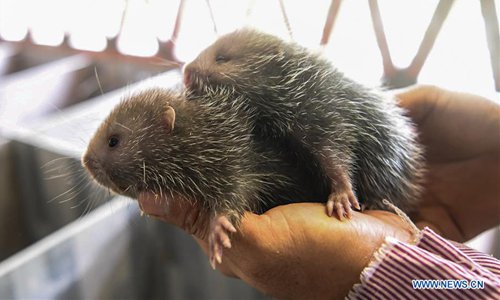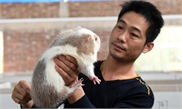
Farmer Lin Jinghong nurses a bamboo rat in Qinzhou city, South China's Guangxi Zhuang Autonomous Region, on July 24, 2019. Photo: Xinhua
As South China's Guangxi Zhuang Autonomous Region and other provinces in China issued guidelines with specific measures forbidding the farming of some wild animals, experts urge the careful and humanitarian handling of the animals.
According to a guideline published by Guangxi on Tuesday, wild animals that have been confiscated from farmers may be released into the wild, used for research and medical purposes and euthanized.
Animals including turtledoves and red muntjac deer shall be released into the wild, while other animals including civet cats, bamboo rats, snakes, porcupines and nutria -- an invasive rodent, will be used for research or other purposes.
Species that carry a high risk of infectious diseases will be euthanized in a manner that prevents causing any environmental problems.
"These measures will help make raising wildlife for food obsolete. But authorities must pay great attention to the relocation and resettlement of these animals and handle the animals in a humanitarian and scientific way," Sun Quanhui, a zoologist from World Animal Protection, told the Global Times on Sunday.
The guideline also said licensed animal raisers will receive compensation ranging from 40 yuan ($5.7) to 2,000 yuan ($286) for each animal.
Other provinces such as Central China's Hunan Province and South China's Jiangxi Province are also compensating wildlife animal raisers.
Bamboo rat raisers in Ganzhou, Jiangxi Province, who are well-known online as "Huanong Brothers" for sharing stories of their farm life, told the Global Times on Sunday that they were satisfied with the compensation.
"We got around 200 yuan ($28) for an adult bamboo rat and 138 yuan ($20) for the small ones, which will more or less cover our costs," they said.
Bamboo rat farmers have experienced a rough half year, said another raiser in Southwest China's Guizhou Province, named Qiu Feng, noting that he hasn't made any money since the Spring Festival, when the local government required rat raisers to stop selling or eating bamboo rats amid concerns the animal might carry the coronavirus.
The provincial guidelines come after the Ministry of Agriculture and Rural Affairs released a national catalogue of livestock and poultry on May 29, in which some wild animals that have long been farmed in China were excluded.
China plans to completely ban the consumption of wild animals, which are the main source of zoonotic infectious diseases, said Sun.
"More than 70 percent of new infectious diseases in humans come from wild animals. Banning the wildlife trade and consumption will help reduce public health risks and prevent another epidemic outbreak," said Sun.

